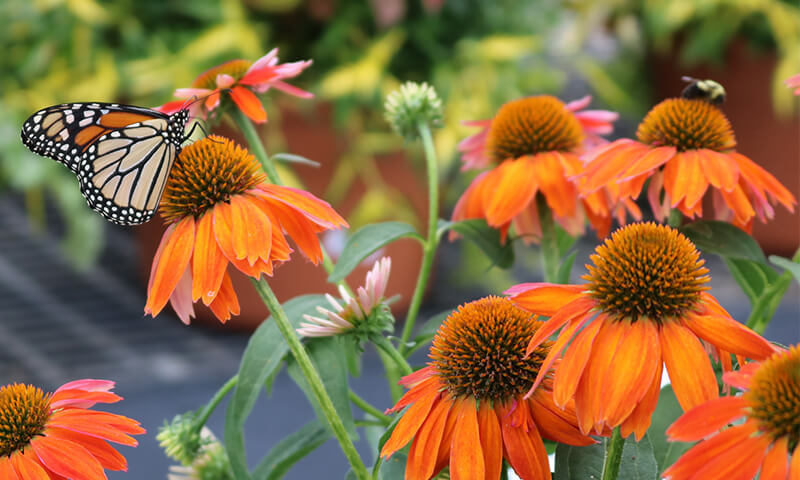7 Things You Can Do for Pollinators – Pollinator Partnership

Help Our Pollinators
Butterflies, bees, birds, beetles, bats, and other small mammals all have something wonderful in common – they all classify as pollinators! Pollinators help to maintain the balance of our planet’s ecosystems. They play a critical role in the production of food by carrying pollen from plant to plant, which plants need to reproduce. These plants in turn produce fruits, veggies, nuts, oils, fibers, and other raw materials that we need for survival.
Why do we need to help our pollinators? From loss of habitat, to invasive species affecting native plants, several factors pose risks to pollinator populations. We must do everything we can to provide pollinators with the resources they need to survive. After all, our own survival depends on the awesome work that they do. So, you can do your part by checking out these 7 things recommended by the Pollinator Partnership.
1. Plant for Pollinators
Habitat opportunities abound on every landscape. From window boxes, acres of farms, and corporate campuses, to utility and roadside corridors, every site can be a habitat.
• Utilize plants native to your area (or at the least, non-invasive for your area).
• Adhere to the Ecoregional Planting Guides and the Garden Recipe Cards to create or enhance your pollinator garden. Decide among the plant material options – seeds, plugs, plants or a combination.
• Know your soil type and select appropriate plant material.
• Plant in clusters to create a “target” for pollinators to find.
• Plan for continuous blooms throughout the growing season, from Spring to Fall.
• Select a site that is removed from wind, has at least partial sun, and can provide water.
• Allow material from dead branches and logs to remain as nesting sites; reduce mulch to allow patches of bare ground for ground-nesting bees to utilize; consider installing wood nesting blocks for wood-nesting natives.
2. Reduce or Eliminate the Impact of Pesticides
Check out the Pesticides Learning Center on the Pollinator Partnership website to learn more about the interactions between pollinators and pesticides!
3. Register as a Bee-Friendly Farming Garden
Register your home or community garden as a Bee-Friendly Farming Garden to showcase your commitment to pollinator health! Along with your registration, you can opt to receive your very own BFF Garden sign to encourage others to do the same. Your registered garden will appear on the Bee-Friendly Farming map, along with any photos you choose to submit.
4. Reach Out to Others – Inform and Inspire!
Utilize all the materials available to you to help tell the story of pollinators, especially during National Pollinator Week (June 20-26). Tell local and state government officials that you care about pollinator health, and spread the word to neighbors, colleagues, friends, and family.
5. Support Local Bees and Beekeepers
When you buy local honey, you support the beekeepers in your area. If you’re concerned about the number of chemicals used in agriculture, buy organic. Also, if you’re concerned about contributions to global carbon emissions, buy local.
6. Conserve all of our Resources – Use Less and Reduce Your Impact
Pollinator populations are dramatically affected by extreme weather patterns. Climate change puts pressure on native ranges and overwintering sites.
7. Support the Work of Groups Promoting Science-Based, Practical Efforts for Pollinators.
You can donate now to the Pollinator Partnership! Visit www.pollinator.org/donate today. Donors may also give to a certain program, should they like to support a more specific pollinator issue. Donation certificates and honor/memory certificates are available using the online forms.
Find out additional information regarding pollinators at www.pollinator.org or by contacting [email protected]
Visit our Home & Garden Stores and pick out the best pollinator-friendly plants for your landscape today!
